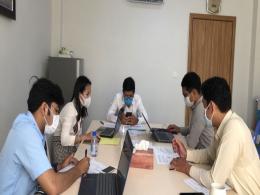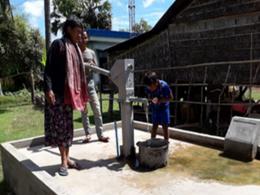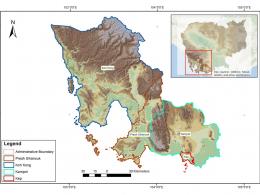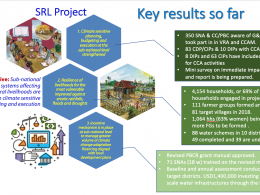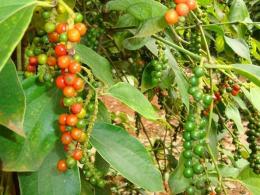Increasing Resilience to Climate Change for Farmers in Rural Cambodia through Climate-Smart Agriculture Practices (IR-CSA)
Background
At present, there is already emerging evidence that agriculture-based livelihoods and overall food security in Cambodia are being affected by increased frequency and severity of floods, dry spells and drought events. Although Cambodia has limited exposure to climate hazards, it is considered to be extremely vulnerable due to its low adaptive capacity.
The majority of Cambodians live in rural areas and their livelihoods depend on climate patterns. It is therefore projected that the poor will suffer the most from the impacts of climate change. Reduced agricultural production could lead to hunger and malnutrition, and impact negatively on the country’s overall economic performance. Given the current context of Cambodia and potential future threats posed by climate change to the country, there is urgent need to respond to the threats of climate change in agriculture and water resources management. Both government agencies and community organizations have limited capacity to internalize and develop appropriate longer-term resilience mechanisms to respond to climate change threats.
Overall Objective
The resilience of vulnerable smallholder farmers is increased by mainstreaming the planning and implementation of climate resilience-building practices in Ministry of Agriculture Forestry and Fisheries (MAFF).
Expected Results
- The staff of MAFF at national and provincial-level improved their capacity to assess the key vulnerabilities along with vulnerable communities and identify a set of cost-effective actions to build resilience to climate change;
- A climate change screening tool is introduced and tested so that the national MAFF programming is contributing toward increasing the resilience of the vulnerable smallholder farmers to climate change;
- The knowledge products including lessons learned are disseminated to MAFF and development practitioners.
Location
Kandal: Saang district
Kampong Cham: Steung Trang district
Kampong Chhnang: Rolea B'ier district
Beneficiaries
100 staff from MAFF at national, sub-national agricultural officials and undergraduate students from Royal University of Agriculture (RUA) will benefit from knowledge and skills in undertaking participatory climate vulnerability assessment
750 vulnerable farmers will be involved in the diagnosis of the vulnerabilities in the different 36 villages and will increase their resilience;
300 stakeholders and RUA students will also directly benefit of the lessons learned of the project through dissemination workshops and field visits.
Approach
This project intervention will support MAFF towards efficient mainstreaming of innovative climate vulnerability participatory modelling approach to simulate the impact of Climate-Smart Agriculture (CSA) strategies in order to increase the resilience of the agricultural systems in Cambodia. After piloting the identified key CSA practices in 7 demonstration sites, an impact evaluation will provide key lessons on cost-effective interventions to increase the resilience of the agricultural systems in Cambodia. These findings will feed the development of a screening tool which will help MAFF to review current and future programs against climate change scenarios in order to identify their potential to tackle the key vulnerabilities and improve the integration of CSA principles. For the demonstration sites, the selected farmers will be smallholder farmers with suitable land for crops, rice cultivation, aquaculture, and livestock production, who have participated to the vulnerability diagnosis and where cost-effective CSA intervention to reduce the vulnerabilities has been identified.
The project will also provide technical support to 100 staff from MAFF and 21 RUA students on participatory climate vulnerabilities modelling and simulation together CSA strategies design training. 750 farmers will increase their resilience to a changing climate and to climate shocks and stresses. Finally, the project will share the lessons learned to development practitioners through the dissemination of the participatory climate vulnerabilities modelling and simulation toolbox and best practices sourcebook to development practitioners and students of RUA.
Achievements to date
- In Kandal province: 10 crops rotation plantation with drip system, 2 agro-clinics and 7 garlic leaves plantations with drip system;
- In Kampong Chham province: 10 diversifying crops plantations with the installation of integrated rain harvesting/storing, 10 crops rotation plantation with drip system and two agro-clinics;
- In Kampong Chhnang province: 8 chicken raising activities, 2 agro-clinics and 8 crops rotation plantations.
- 11 training courses and coaching on various topics including vegetable crop production cultivation techniques and rotation crop planting method and Pests, diseases management, using trichoderma on garlic were provided by PDAFF for the beneficiary households;
- Additional different types of books/resources documents and leaflets were collected to put in each agro-clinic.
- The farmer fields day were conducted with 254 farmers (90 women).


